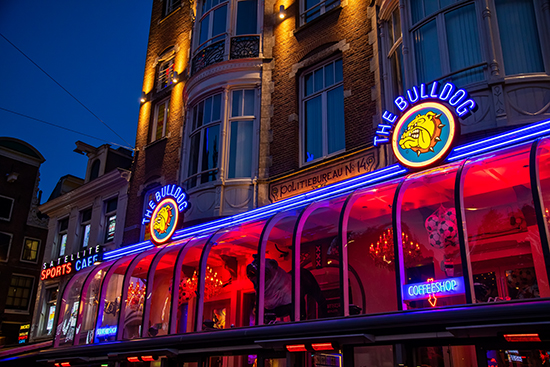A trip to Amsterdam may be a post-COVID dream plan for many visitors, but if they are expecting to engage in some recreational weed smoking while in the city, mayor Femke Halsema is letting them know they should curb their enthusiasm.
The Green Party leader began 2021 by stating her desire to impose a ban on selling cannabis to foreigners visiting the Canal District in a near future, in a letter addressed to councillors. Attached to the letter was a survey in which 34% of tourists stated they would think twice about visiting Amsterdam if they were barred from buying weed in any of the city’s 166 coffee shops.
According to Halsema, the policy would serve as another attempt to control the city’s mass tourism problem. Prior to the pandemic, Amsterdam, a city of less than a million inhabitants, attracted around 19 million visitors each year. “There is a huge demand to get tourists under control,” the mayor has said. She believes that the Netherlands’ relaxed soft drug policy shouldn’t give way to “big groups of youngsters throwing up in the canals because they’ve had too much to smoke”. The measure would also serve to control the paradoxical “backdoor policy” which operates in the city, much like in the rest of the Netherlands – referring to the unregulated cultivation of cannabis, to be sold for public consumption.
A similar ban has already been put in place in the southern city of Maastricht, but, given Amsterdam’s world-renowned weed friendly reputation, the mayor’s suggestion has made a far greater splash in international news. The residency requirement would result in the reduction in the number of coffee shops, many of which serve mostly tourists. Halsema says that, according to recent studies, 73 of these establishments would suffice to meet local cannabis demand.
The suggestion is not new, but it is perhaps the closest it has been to being enforced; Halsema will discuss it further with the city council at the end of the month. The mayor’s announcement reflects a long-time desire to rid Amsterdam of its current international image, which often leads rowdy tourists to overlook the city’s cultural sites in favor of the red-light district and coffee shops. “Everyone knows Amsterdam – now it’s about improving the city’s reputation” said Nico Mulder, who founded the Enjoy & Respect campaign three years ago. “The coffee shops attract visitors who think everything is allowed in Amsterdam.”
But not all are in agreement with Halsema’s push for a ban of tourists to the city’s coffee shops. Tom Nabben, a criminologist at Amsterdam University of Applied Sciences, has his reservations. He warns that denying tourists access to weed will only make them look for it elsewhere, encouraging street dealers. But Halsema remains focused on her plan, citing the police and the public prosecutor’s office, who are in full support of the measure. The mayor expects it to cause the tourist demand for soft drugs to decline. One is left wondering if tourist numbers will fall too. Halsema herself predicted that the city could expect up to 29 million visitors by 2025, but perhaps this measure will help to reduce these numbers.
Halsema’s announcement comes at a time in which Amsterdam is still under lockdown, due to the rise in new COVID-19 cases and the arrival of new variants over the holiday period. Despite the closure of all non-essential businesses, coffee shops remain open, under the condition they operate only as takeaways. The lockdown will last at least until 9 February. The Dutch government is strongly advising against foreigners to visit the country unless strictly necessary; travel from some countries, such as the UK, is banned completely.
If Halsema’s proposition goes through, Amsterdam may look like a very different destination to visitors in the near future. However, the mayor has stated that the measure will probably not be applied until sometime next year.
Written by Beatriz Negreiros
